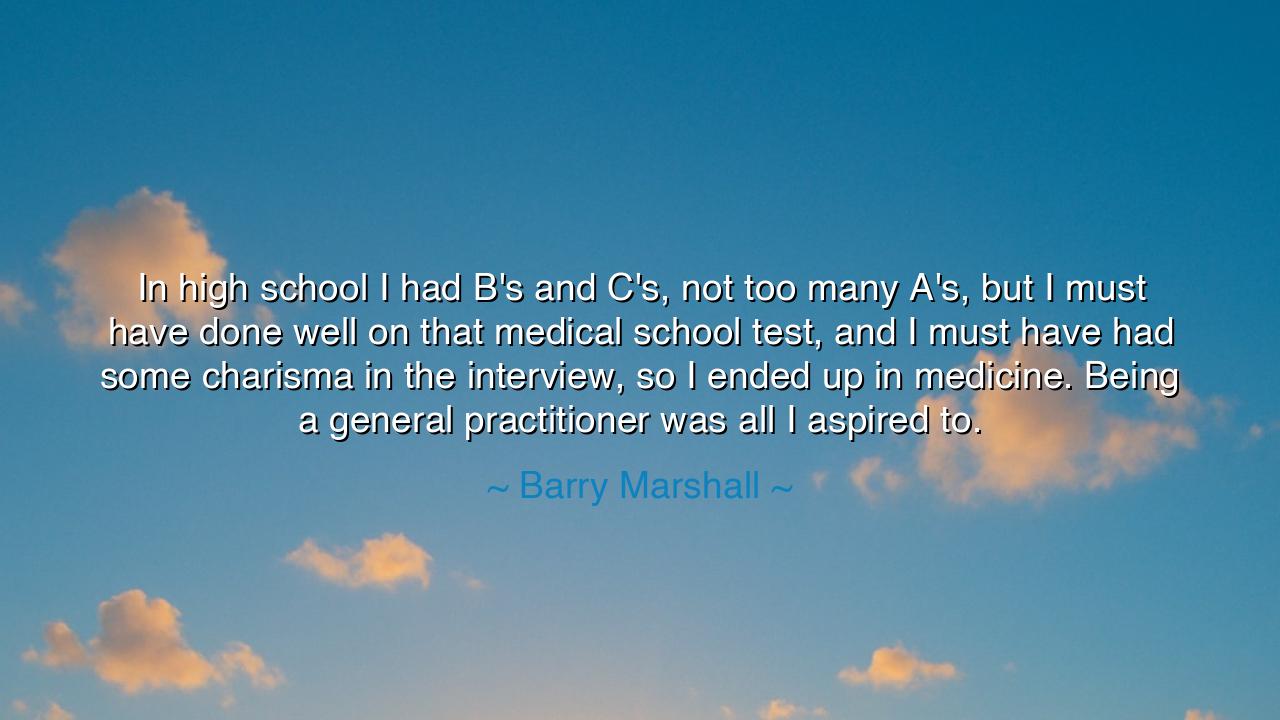
In high school I had B's and C's, not too many A's, but I must
In high school I had B's and C's, not too many A's, but I must have done well on that medical school test, and I must have had some charisma in the interview, so I ended up in medicine. Being a general practitioner was all I aspired to.






When Barry Marshall reflected, “In high school I had B's and C's, not too many A's, but I must have done well on that medical school test, and I must have had some charisma in the interview, so I ended up in medicine. Being a general practitioner was all I aspired to,” he spoke with a humility rare among the great. These words come not from one who failed to reach lofty heights, but from a Nobel Prize-winning physician who reshaped the understanding of human disease. In his modest confession, there is a lesson more profound than any textbook can teach: greatness is often born not of perfection, but of persistence, courage, and the refusal to measure oneself only by early grades.
The first truth in his words lies in the recognition of imperfection. Marshall does not hide behind the veil of flawless achievement; he admits to B’s and C’s, to a youth marked not by brilliance but by ordinary struggle. Yet, from this ordinary beginning emerged a physician who would overturn the entrenched medical dogma of his age by proving that bacteria, not stress, cause ulcers. This is the heroic paradox: that the one who seemed average in school became a revolutionary in science. Thus, his words remind us that early judgment is not destiny.
The second truth rests in the mention of a single turning point: the medical school test and the interview. In those moments, preparation and chance intertwined, and his path into medicine opened. Here we see the ancient truth that life often hinges on moments of trial, where the measure of a person is tested not in years, but in hours. Like the soldier before battle, like the athlete before the contest, Marshall faced his moment—and passed through into destiny. His story tells us: do not despair if the journey is long and marked by imperfection, for a single moment of courage and clarity can change the course of a life.
Yet Marshall’s words also carry humility in his aspiration: “Being a general practitioner was all I aspired to.” He did not dream of crowns or fame, but of serving ordinary people, of healing families, of practicing medicine in the most human and grounded way. And yet, from this humble beginning came discoveries that altered the foundations of gastroenterology. History teaches us that it is often those who seek only to serve who end up shaping the world. Just as Cincinnatus, the Roman farmer, was called to lead Rome and then returned to his plow, so too Marshall’s greatness was born of humility, not ambition.
Consider the story of Albert Einstein, who in his youth was dismissed by teachers as slow, uninterested, and unremarkable. He worked as a clerk in a patent office, far from the halls of glory. Yet it was there, in obscurity, that he nurtured the thoughts that would reshape physics. Like Marshall, his early path did not glitter, but his persistence and curiosity transformed the world. These stories reveal the same lesson: do not mistake beginnings for endings, nor the ordinary for the unworthy.
The deeper meaning of Marshall’s reflection is this: aspiration need not be grand to be transformative. The desire simply to practice medicine, to help others, became the soil from which world-changing science grew. Greatness is not always sought; often it comes upon those who labor with sincerity, who walk faithfully in the path of service, and who dare to question what others accept blindly. Marshall’s discoveries, born from persistence and audacity, proved that even a “C student” can shake the pillars of science.
For us, the lesson is timeless. Do not let your early struggles define your future. Do not despise small aspirations, for they may be the seeds of greatness. When trials come—whether in exams, interviews, or daily labors—face them with courage, for in such moments doors open that lead to destinies unseen. And above all, embrace humility, for it is the heart of true greatness.
Practical wisdom follows: if you stumble, rise again; if your grades falter, keep striving; if your dreams seem small, pursue them with honesty. Remember Marshall’s story, and let it teach you that perfection is not required, only persistence. In this way, you will find that the path of the ordinary may one day lead to the extraordinary, and that the seeds of service may bear fruit that changes the world. This is the legacy of Barry Marshall’s words: that humility and persistence, not brilliance alone, are the true architects of destiny.






AAdministratorAdministrator
Welcome, honored guests. Please leave a comment, we will respond soon